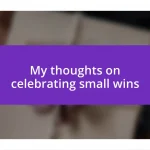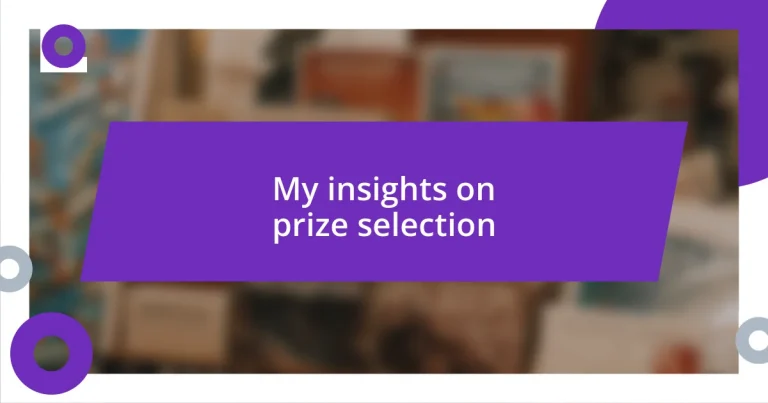Key takeaways:
- Choosing the right prizes fosters deeper connections and reflects the values of the organization, making thoughtful selection essential for engagement.
- Effective prizes align with audience interests, have perceived value, and create meaningful experiences, enhancing participant motivation and excitement.
- Evaluating prize success involves understanding emotional connections and gathering feedback, contributing to continuous improvement in future selections.
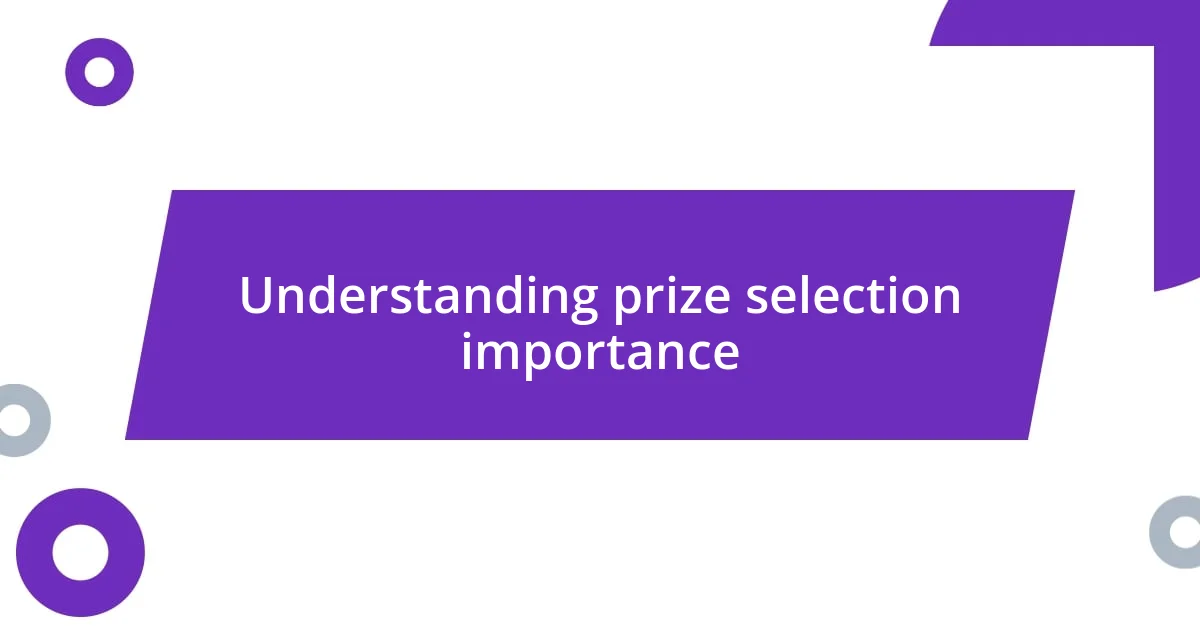
Understanding prize selection importance
Understanding the importance of prize selection is crucial, as it can significantly influence motivation and engagement. I remember organizing a community event, and we had to choose between a big flashy gift or a meaningful, personalized one. The latter resonated more with participants, creating a sense of belonging that lasted well beyond the event. Isn’t it fascinating how the right prize can foster deeper connections?
Consider this: when selecting a prize, what message are you sending? It’s about more than just the reward; it reflects the values of your organization or community. In one of my experiences, we awarded a unique opportunity to the winner instead of material goods, which inspired others to strive for personal growth. This choice turned out to resonate more profoundly with everyone involved.
Ultimately, the process of choosing the right prize isn’t just a formality; it embodies recognition and appreciation. Think about how rewarding it feels when someone truly understands what you value. By choosing thoughtfully, you can create a ripple effect that encourages others to engage and participate—a powerful reminder of the significance of prize selection.
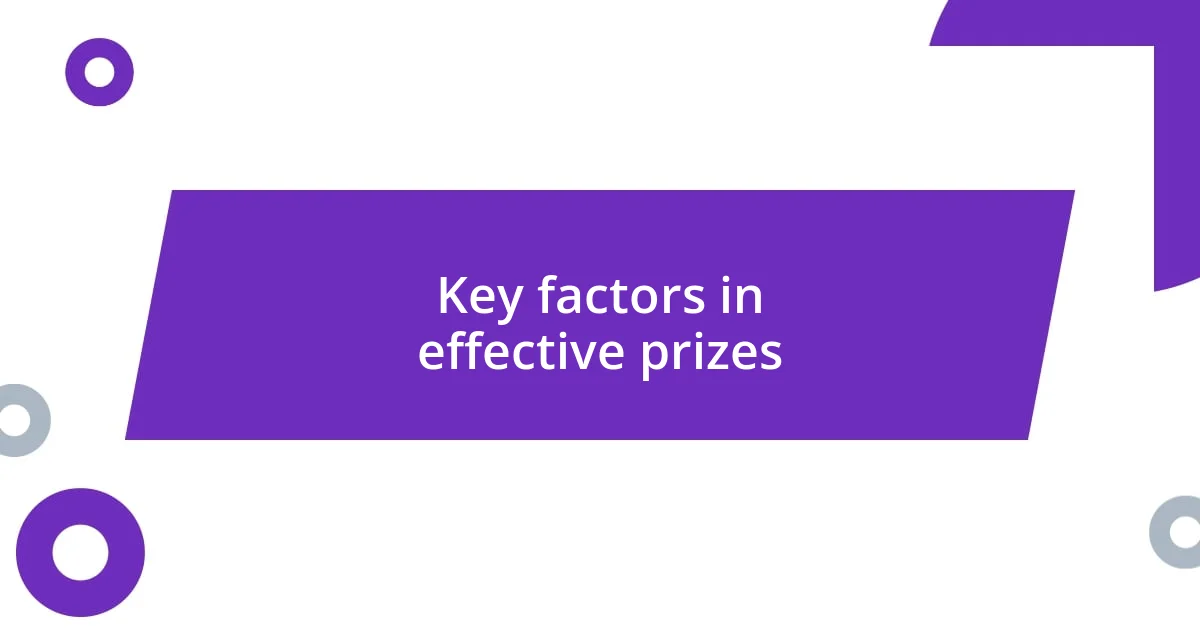
Key factors in effective prizes
When considering effective prizes, it’s essential to align them with the interests and motivations of the target audience. In my experience, prizes that resonate on a personal level often yield the most enthusiastic responses. For instance, I once participated in a contest where the prize was an exclusive mentorship session with an industry leader. The value of that experience far surpassed any physical gift, sparking a genuine drive among participants to compete fiercely for it.
Here are key factors to consider in effective prizes:
- Relevance: Ensure the prize aligns with the participants’ interests or goals.
- Perceived Value: Choose prizes that participants view as valuable, whether tangible or experiential.
- Inclusivity: Offer options or variations to cater to diverse preferences within the group.
- Impact: Select prizes that provide meaningful experiences, fostering personal growth or connections.
- Visibility: Highlight the prize in promotional materials to generate excitement and motivation.
By focusing on these factors, the prize selection process can transform from a routine task into a strategic opportunity for engagement.
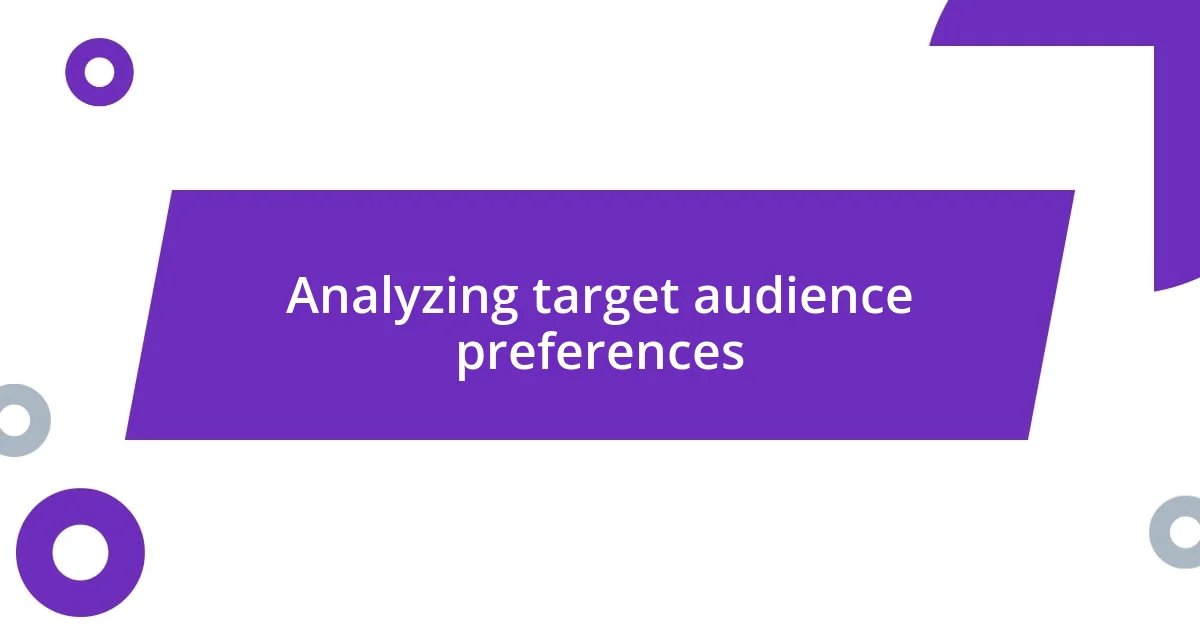
Analyzing target audience preferences
When analyzing target audience preferences, I’ve learned that understanding what truly resonates with them is vital. For example, during a charity raffle, I once noticed that a signed sports jersey drew much more attention than a generic gift card. It was evident that for those participants, the connection to a beloved team brought not just excitement, but also a rush of nostalgia that a simple card couldn’t match. This experience made me realize how personal connections to prizes can dictate engagement levels.
All preferences hinge on relatability. I’ve organized events where feedback highlighted a common theme: participants valued experiences over material gifts. Once, when a spa day was offered as a prize, the response was overwhelming. Attendees expressed that it wasn’t just about relaxation; it represented a well-deserved break in their busy lives. This taught me that tapping into the emotional and experiential values of prizes can significantly enhance how your audience feels about participating.
Now, let’s look at how different factors influence prize selection for varied target audiences. After all, it’s not just about picking something random; it’s about making a genuine connection with the participants.
| Factor | Example for Sports Enthusiasts |
|---|---|
| Relatability | Signed jerseys or memorabilia |
| Value | VIP tickets to a game versus merchandise |
| Inclusivity | Offering both family passes and solo adventures |
| Impact | Experiences like meet-and-greets with athletes |
| Visibility | Promoting prizes through community sports events |
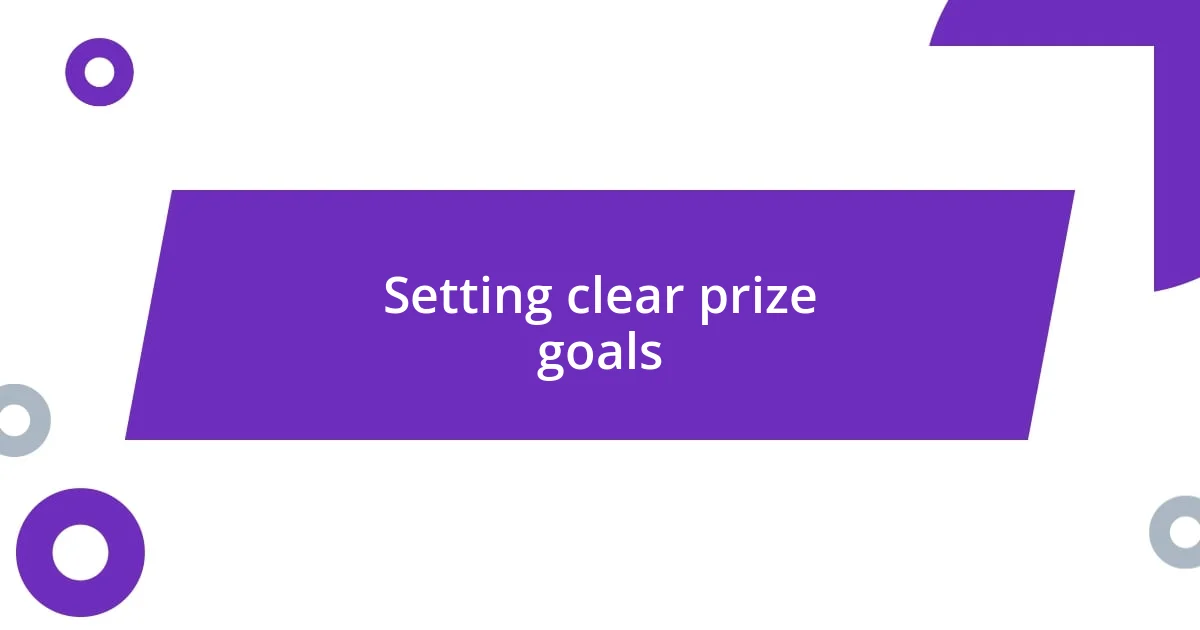
Setting clear prize goals
Setting clear prize goals is a crucial step in ensuring your prize selection resonates with participants. From my perspective, defining what you want to achieve with the prize can guide your decisions. For instance, do you want to drive engagement, promote a new product, or simply reward loyalty? I remember once working on a prize-driven campaign where our goal was to boost participation in a community event. With that focus, we opted for a local experience that truly excited the audience, which became a game-changer.
Another aspect of setting clear prize goals is aligning them with measurable outcomes. Like I often say, if you can’t measure it, how do you know it worked? In one project, I set a clear goal to increase sign-ups by 30%. By offering a prize that appealed to our audience’s passions, we not only met that goal but exceeded it. The thrill of winning something that resonated so deeply led to a 50% increase in participation – a result that far surpassed my initial expectations.
Ultimately, I believe that clarity in your objectives translates to clarity in your prize offerings. When I reflect on past experiences, it’s evident that having specific goals, whether for engagement or brand awareness, drives the entire selection process. This strategic focus empowers you to choose prizes that aren’t just attractive, but also functional, creating a cycle where both the participation and the excitement soar.
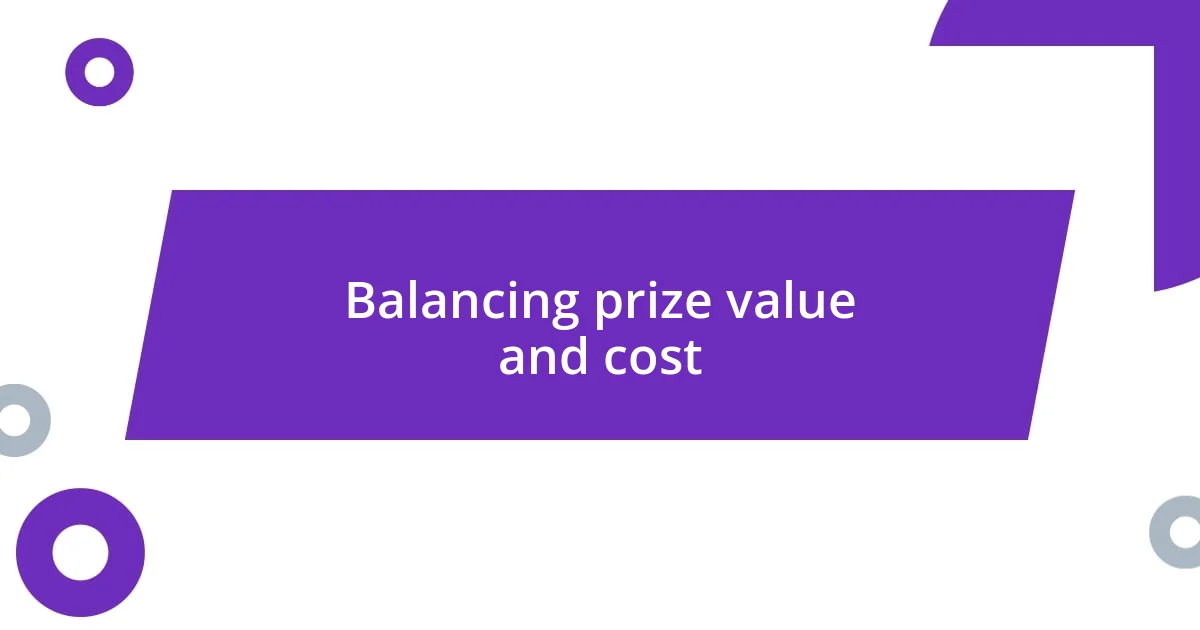
Balancing prize value and cost
Finding the right balance between prize value and cost can be quite a challenge, but I’ve found it to be crucial. In my experience organizing events, I’ve sometimes faced a dilemma: should I invest heavily in a high-value prize that could strain the budget, or opt for something more modest yet meaningful? I remember a local charity auction where I carefully selected items that weren’t the most expensive but carried emotional weight. The results were quite telling—participants were more enthusiastic about winning a unique piece of local art than a pricey gadget. This taught me that often, the value of a prize isn’t just in its monetary worth but in its ability to resonate with the audience.
Additionally, considering the long-term impact of your prize choices is essential. One time, I decided to offer a well-known local restaurant gift voucher as a grand prize. While it fit comfortably within the budget, the buzz it created was priceless! Participants were excited not only about the prize itself but also about the opportunity to share their experiences online. Balancing cost and value meant we achieved significant brand visibility without overspending. It sparked reflections in me—what if the narrative around a prize could be more valuable than the prize itself?
Ultimately, the goal is to make every dollar spent on prizes count. I’ve learned that a strategic selection tied to the audience’s interests can often yield better engagement than simply going for high-cost items. Have you considered how to derive maximum enjoyment from your budget? I urge you to think about the stories your prizes tell and the connections they foster. This approach may not only enrich the experience for participants but also create lasting memories that enhance your event’s reputation.
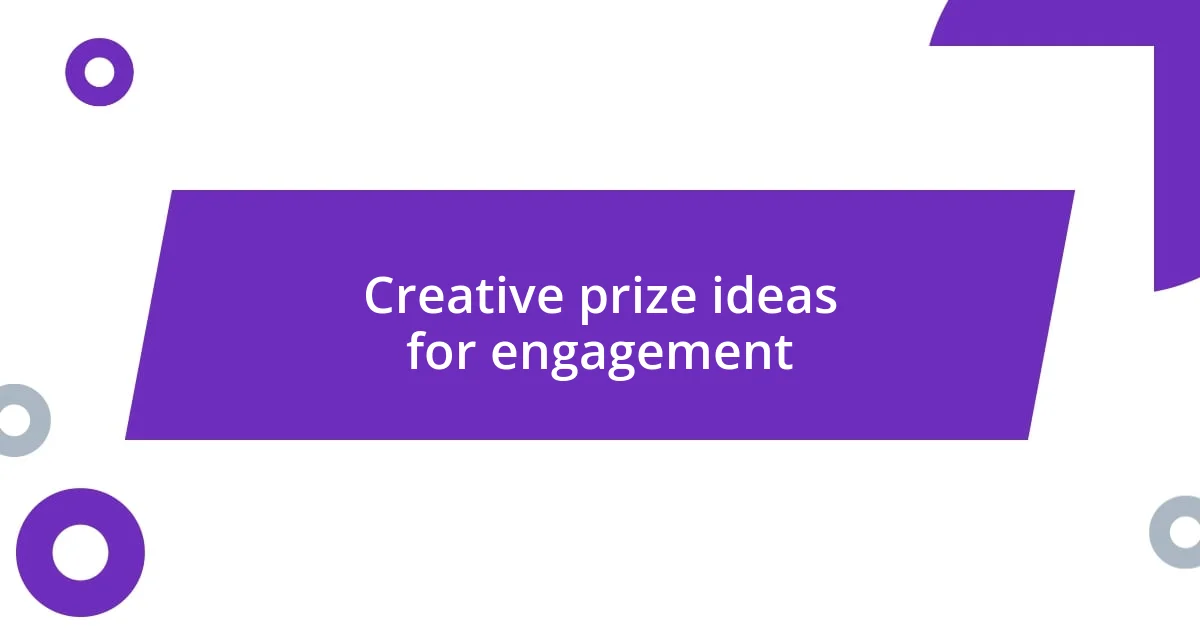
Creative prize ideas for engagement
Creative prize ideas can truly transform engagement levels and provide memorable experiences for participants. I once introduced a “mystery prize box” in an online contest, where the contents remained a surprise until after the event. It sparked incredible curiosity and conversation among participants. The excitement of not knowing what they might receive kept them engaged and eager to participate. Isn’t it fascinating how a little mystery can breathe new life into a standard prize setup?
Another approach I find rewarding is incorporating experiential prizes that allow winners to create meaningful memories. For one event, we offered a “behind-the-scenes” tour of our facility, giving winners an exclusive glimpse into how we operate. Not only did this foster a personal connection with our brand, but it also encouraged winners to share their experiences on social media, amplifying our reach. I’ve found that people love to share unique experiences; don’t you think the stories behind those experiences often outweigh the prizes themselves?
From my perspective, themed prizes can also heighten engagement. I once organized a contest during a festive season where winners received personalized gift baskets tailored to that theme—think cozy winter treats or summer fun gear. Participants were thrilled not just about the basket but about the thoughtfulness behind it. It’s a reminder that connecting with your audience on an emotional level can transform a simple prize into something they cherish. Have you ever considered how a prize can reflect your audience’s interests and passions? Engaging prizes rooted in genuine connection often leave a lasting impact.
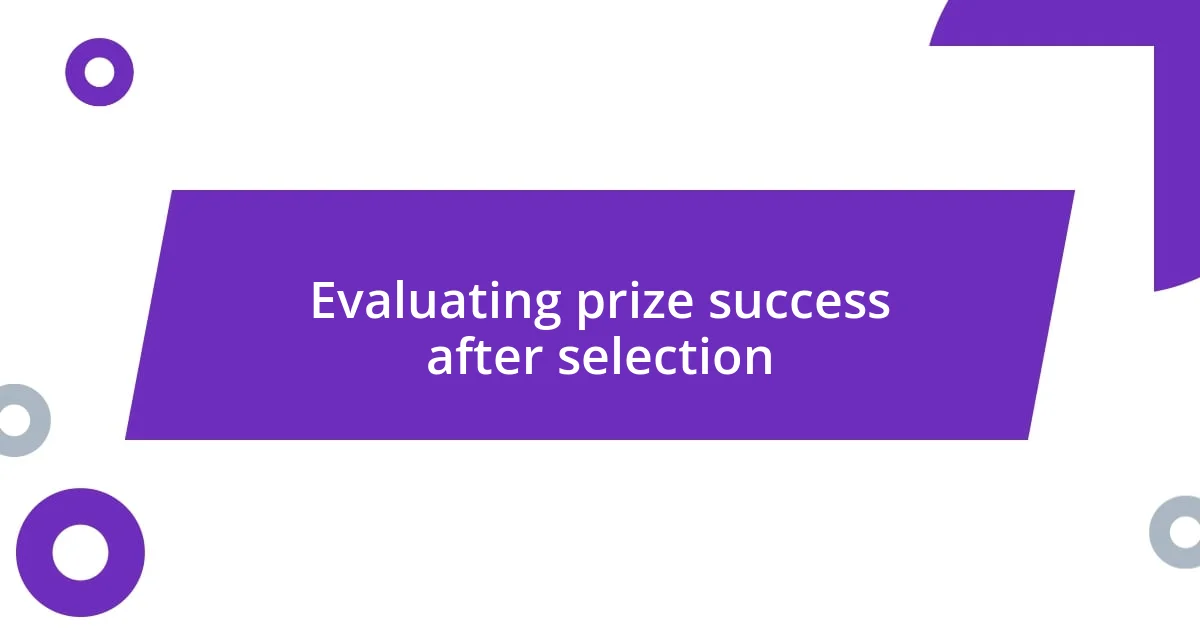
Evaluating prize success after selection
Evaluating the success of a prize after selection involves more than just measuring participation; it’s about understanding the emotional connections fostered by your choices. I recall one year when I opted for a locally crafted gift as a prize for a community event. The reaction was palpable; people didn’t just want to win; they wanted to own something that represented their community. Have you ever noticed how a well-chosen prize can spark conversations long after the event? It’s a reminder that the impact of selection often extends beyond the immediate.
Moreover, I’ve learned that collecting feedback is crucial in this evaluation process. After hosting a contest, I sent out a simple survey just to gauge the participants’ feelings about the prizes. The insights I gathered were invaluable! Participants shared how the prizes made them feel valued and appreciated. This feedback loop not only informed future selections but also highlighted the relationship between prize resonance and overall event satisfaction. It got me thinking—are we truly listening to the voices of our participants?
Lastly, I find it important to measure how prizes contribute to engagement long after they are awarded. For instance, I once awarded cooking classes as prizes. Participants not only enjoyed the experience but also shared their dishes on social media, creating a ripple effect of interest. This made me realize that the success of a prize should be assessed in terms of its ability to spark continued interaction. How are you tracking the stories your prizes create? Creating a lasting legacy from your prize choices can elevate future events and bring your community closer together.





